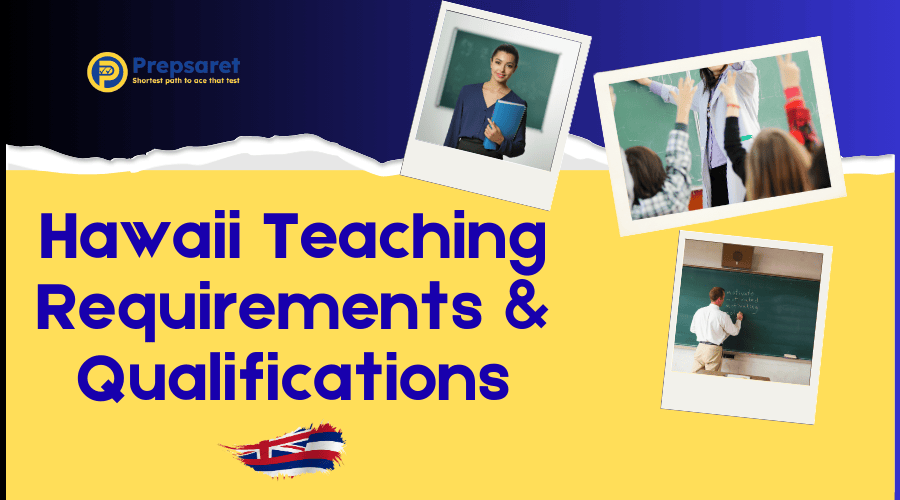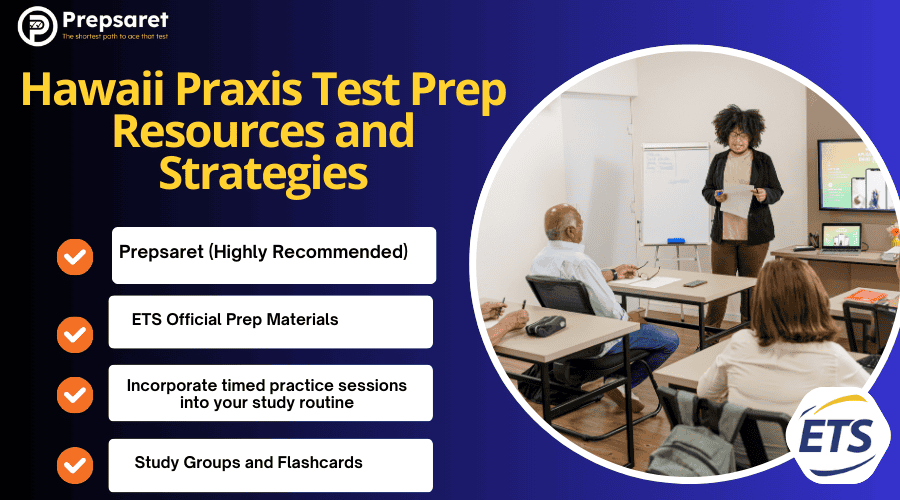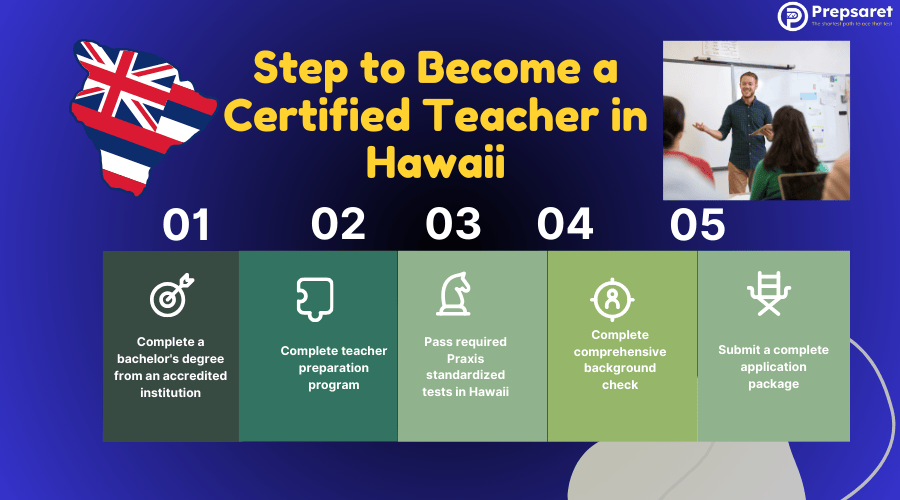How to become a teacher in Hawaii is a question many educators ask as they consider joining the beautiful island state’s education workforce. With its stunning landscapes and unique cultural diversity, Hawaii offers an incredible teaching environment.
The state currently faces a significant teacher shortage Hawaii, creating numerous opportunities for qualified educators. Whether you’re a mainland teacher seeking reciprocity or someone starting fresh, Prepsaret provides comprehensive prep materials and practice tests to help you ace your teaching certification exams and professional development requirements.
Overview of the Hawaii Education System
The Hawaii education system is unique because it functions as a single, statewide school district rather than multiple local districts. All public school teaching in Hawaii is managed by the Hawaii Department of Education (HIDOE), which oversees curriculum, hiring, and teacher licensure across the islands.
This centralized structure provides:
- Consistent teaching standards statewide
- Streamlined hiring practices for educators
- A unified approach to curriculum and testing
- Clearer teacher certification and licensing processes
Serving more than 180,000 students in nearly 300 schools, the system makes it simpler for future educators exploring how to become a teacher in Hawaii, since there’s one primary authority to work with instead of navigating separate districts.
Hawaii Teaching Requirements & Qualifications
Meeting the Hawaii teaching requirements is the first step toward earning certification. The state enforces clear standards, and all educators must demonstrate the necessary Hawaii teacher qualifications before entering the classroom.
Related: Emergency Teacher Certification Requirements in Hawaii
Basic Eligibility Criteria for Hawaii Teacher Licensure
To secure teacher licensure in Hawaii, candidates must meet the following core criteria:
- Hold a bachelor’s degree from an accredited institution
- Complete a state-approved teacher preparation program
- Earn passing scores on the required Praxis examinations
- Undergo fingerprinting and a clean background check
- Demonstrate English language proficiency
Subject-Specific Teaching Requirements in Hawaii
Beyond the basics, different roles demand additional Hawaii teacher qualifications:
- Elementary teachers must show broad subject knowledge across core content areas
- Secondary teachers need proven expertise in their subject specialization
- Special education teachers require targeted training and preparation
- English Language Learner (ELL) teachers may need endorsement in language instruction
Because of the centralized Hawaii education system, these requirements are applied consistently across all islands, ensuring every student benefits from equally qualified teachers statewide.
Read more: Praxis test in Hawaii
Teacher Preparation Programs in Hawaii
Aspiring educators can choose from several teacher preparation programs in Hawaii that are officially recognized by the state. Both traditional university pathways and alternative certification routes are available, giving candidates flexibility in how they prepare for the classroom.
Traditional University Teacher Education Programs
A Hawaii State-approved Teacher Education program can be completed at leading institutions, including:
- University of Hawaii at Manoa – College of Education
- University of Hawaii at Hilo – Teacher Education Program
- Chaminade University – Education Division
- Hawaii Pacific University – College of Education
Core Components of Hawaii Teaching Credential Programs
These teaching credential programs in Hawaii typically include:
- Education theory and methodology courses
- Subject-specific content preparation
- Student teaching experiences
- Assessment and evaluation training
State Approved Teacher Education Program (SATEP) in Hawaii
The State Approved Teacher Education Program (SATEP) designation ensures quality preparation. To earn this recognition, institutions must demonstrate:
- Comprehensive curriculum alignment with state standards
- Qualified faculty with relevant experience
- Adequate field experience opportunities
- Regular program assessment and improvement
These requirements ensure that every future teacher in Hawaii is equipped with the knowledge, skills, and practical training needed to succeed in the classroom.
Related post: Best Praxis Study Resources
Alternative Teacher Certification in Hawaii
Many career changers and non-traditional candidates explore alternative teacher certification in Hawaii as a pathway into the profession. These programs are designed to address workforce needs and expand access to teaching opportunities across the islands.
Read More on Hawaii Alternative Teacher Certification
How to Get Alternative Teacher Certification in Hawaii
Aspiring educators who do not follow the university route can qualify through specialized initiatives such as:
- Teacher Shortage Area Program (TSAP)
- Military to Teaching Program
- Troops to Teachers Initiative
- Career and Technical Education Alternative Certification
How to Become a Teacher in Hawaii Without a Traditional Education Degree
These pathways allow individuals with relevant professional or subject expertise to transition into the classroom while completing required training.
How to Become a Teacher in Hawaii for Free
Funding support may be available through:
- Federal grant programs for high-need areas
- Scholarship opportunities through HIDOE
- Loan forgiveness programs for committed teachers
- Graduate assistantships at state universities
How to Become a Teacher in Hawaii Online
Some institutions also provide flexible study formats, including:
- Fully online coursework modules
- Hybrid learning models blend in-person and virtual instruction
- Distance-based professional development for licensure renewal
Through these routes, candidates expand their options in how to become a teacher in Hawaii while meeting the state’s certification standards.
Related: Become a Teacher in Hawaii Without a Teaching Degree
Steps to Become a Certified Teacher in Hawaii
Understanding how to become a teacher in Hawaii requires moving through a clear sequence of requirements. Each stage ensures candidates are fully prepared for classroom responsibilities.
Step 1: Complete Your Education
Begin your journey to understand how to become a teacher in Hawaii by:
- Earning a bachelor’s degree in your teaching area
- Completing a teacher preparation program
- Maintaining a minimum 2.75 GPA
Step 2: Pass Required Examinations
Hawaii teacher licensure requirements explained include several testing components such as:
- Praxis Core Academic Skills for Educators
- Praxis Subject Assessments for your teaching area
- Praxis Principles of Learning and Teaching (PLT)
Related blog post: praxis practice test
Step 3: Apply for Licensure
Knowing how to apply for a Hawaii teaching license involves completing the Hawaii teaching license application, which requires:
- Submitting the Hawaii teaching license application
- Paying required fees ($75 initial application)
- Providing official transcripts
- Completing background checks
Step 4: Complete Additional Requirements
Final steps to become a certified teacher in Hawaii include:
- Student teaching or internship completion
- First aid/CPR certification
- TB testing and health clearance
- Professional ethics training
For most candidates, the entire process from application to license approval takes about 4-6 months. With these milestones completed, you’ll be ready to join the classroom and fulfill your goal of how to become a teacher in Hawaii.
Hawaii Teacher Licensure, Reciprocity & Professional Tools
Earning and maintaining a teaching credential is only part of how to become a teacher in Hawaii. Educators must also understand license management, verification tools, and reciprocity pathways for out-of-state applicants.
How to Manage Your Hawaii Teacher License
Once you earn your credential, maintaining a valid Hawaii teacher license is essential. Renewal operates on a five-year cycle and requires:
- Completing six continuing education credits per renewal period
- Documented participation in professional development activities
- Maintaining good standing in the teaching profession
Hawaii Teacher Certification Verification Tools
The Hawaii teacher license lookup system makes it easy for employers, colleagues, and candidates to confirm credentials. Verification is available through:
- HIDOE’s online licensing database
- The state’s professional license search portal
- Direct inquiries to the licensing division
Reciprocity Pathways for Out-of-State Teacher
The Hawaii teacher reciprocity requirements for out-of-state teachers provide a pathway for mainland educators who wish to work in the islands. To qualify, candidates must show:
- A valid teaching license from another state
- A three years of successful teaching experience
- Passing scores on Hawaii-specific examinations
- Completion of Hawaii-specific training modules
For qualified applicants, the Hawaii teacher certification reciprocity process typically takes 30–90 days, creating a streamlined transition for educators relocating to the islands.
Read more: State by State Praxis requirements
Hawaii Teaching Jobs Overview
Finding the right position is an important step in how to become a teacher in Hawaii. The state’s education system offers diverse career options, with strong demand in certain subject areas and competitive benefits for those joining the workforce.
High-Demand Teaching Positions in Hawaii
Teaching jobs in Hawaii are abundant due to ongoing shortages. Priority areas include:
- Special education across all levels
- Mathematics and science secondary positions
- Elementary education statewide
- English Language Learning specialists
Hawaii Department of Education Employment Benefits
Working as a Hawaii Department of Education teacher offers unique advantages, including:
- Comprehensive benefits and retirement plans
- Long-term job security with tenure opportunities
- Access to structured professional development
- The chance to contribute to Hawaii’s diverse cultural and educational environment
The teacher shortage Hawaii creates excellent opportunities for new graduates and experienced educators alike, who want to build a rewarding career in the islands.
Related: Hawaii Teaching Certificate Renewal
Teacher Salary and Career Growth in Hawaii
Teaching in Hawaii offers more than a rewarding classroom experience; it also comes with a structured pay scale and a wide range of benefits. Understanding compensation and career growth helps aspiring and current educators plan for long-term success in the state’s education system.
How Much Do Teachers Make in Hawaii in 2026
The Hawaii teacher salary structure provides competitive compensation:
- Starting salary: $51,000 – $54,000 annually
- Experienced teachers: $60,000 – $80,000+
- Administrative positions: $85,000 – $120,000+
Factors Affecting Teacher Salaries in Hawaii
Earnings are influenced by:
- Years of experience
- Education level completed
- Additional certifications held
- Leadership responsibilities
Comprehensive Benefits for Hawaii Teachers
Alongside salary, teachers enjoy a strong benefits system that supports long-term stability and growth, including:
- Health insurance coverage
- Retirement system participation
- Professional development funding
- Sabbatical leave opportunities
Do You Need a Master’s Degree to Teach in Hawaii?
A bachelor’s degree is the minimum requirement to teach in Hawaii, but earning a master’s degree can provide significant advantages for career growth and salary potential.
Minimum Education Requirement to Teach in Hawaii
With a bachelor’s degree you can:
- Obtain initial teaching licensure
- Begin classroom teaching immediately
- Pursue professional development while teaching
- Apply for most teaching positions
Benefits of Earning a Master’s Degree in Education
Pursuing a graduate degree unlocks:
- Higher starting salary placement
- Enhanced career advancement opportunities
- Specialized endorsement possibilities
- Administrative pathway preparation
Many teachers pursue master’s degrees while working, using online and evening programs to advance their careers.
How to Become a Teacher in Hawaii: FAQs
What Is Required to Be a Teacher in Hawaii?
You must have a bachelor’s degree, complete an approved teacher preparation program, pass the required Praxis exams, and submit an application through the Hawaii Teacher Standards Board (HTSB). A background check is also required.
Is it Hard to Get a Teaching Job in Hawaii?
No, Hawaii has a consistent teacher shortage, especially in special education, STEM subjects, and rural schools. This creates strong demand and makes it easier for both new graduates and experienced educators to secure positions.
What Is the Quickest Program to Become a Teacher?
Alternative licensure programs are the fastest option, with some allowing candidates to begin teaching in as little as one year while completing certification requirements.
How Much Do Teachers Make in Hawaii?
Hawaii teachers earn competitive salaries, with starting teachers making $51,000–$54,000, experienced educators earning $60,000–$80,000+, and administrators receiving between $85,000–$120,000+ annually.
How Fast Can I Get a Teaching Certification?
If you already hold a bachelor’s degree, you may qualify for an alternative certification in as little as 12 months, depending on your chosen program and how quickly you complete exams and requirements.
How to Become a Teacher in Hawaii: Conclusion
How to Become a Teacher in Hawaii involves navigating state-specific requirements, completing approved preparation programs, and passing necessary examinations. The state’s unique centralized system simplifies the process while creating abundant opportunities due to ongoing teacher shortages.
Whether pursuing traditional or alternative certification paths, success depends on thorough preparation and understanding of how to become a teacher in Hawaii requirements. Start your journey today by researching approved programs, preparing for certification exams with Prepsaret’s comprehensive study materials, and taking advantage of our unique AI-powered practice tests that simulate real exam conditions for optimal preparation success.





